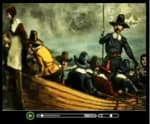Pilgrims
Pilgrims: The Escape of Courageous People
The Pilgrims were English Separatists who founded Plymouth Colony in 1620. The Pilgrims, fleeing religious persecution, broke away from the Church of England because they felt the Church violated biblical principles of true Christians. Due to persecution and economic distress, they believed they had to break away from the Church of England to form congregations which were more in keeping with divine requirements. Coming out of the recent Reformation, the pilgrims believed the Church of England had not come far enough. The Church was under strict rule of the State so their actions were considered treasonous and these Separatists had to flee their homeland.
Determined and very courageous men and women committed themselves (in all aspects of their lives) to life based on the Bible and a relationship with God. They brought their only known culture and spiritual values to the New World and attempted to establish an improved foundation of English society on an unfamiliar new continent.
Pilgrims: A Matter of Survival
These unprepared new arrivals knew little of how to survive the harsh winters in the New World. After arriving in December of 1620, more than half of them had died of starvation before spring. By the next winter, an English-speaking Indian named Squanto taught the immigrants how to build homes fitting to the climate, when to plant indigenous crops (maize), and how to cook it. But there are other parts of the story that are less known. Governor William Bradford wrote that Squanto was “a special instrument sent by God for their good beyond their expectations…” With gratitude of God sending Squanto and providing the following year’s bounty, the Colonists, Squanto, Chief Massasoit, and the Wampanoag people feasted on the crops' harvest and wild game, giving thanks to God.
These early Plymouth Colony settlers were deeply religious people. To express their gratitude for survival and the harvest appropriately, they looked to the Bible. They read of the Hebrew’s celebrated Feast of Sukkot, also called Feast of the Tabernacles or Feast of Ingathering. This festival was the most joyous of all celebrations, ingathering the people and the harvest. Following the bible verses, they gave all honor to God for providing and for sending the Wampanoag people to help them survive.
Leviticus 23:33-34 says, “The LORD said to Moses, ‘Say to the Israelites: “On the fifteenth day of the seventh month the LORD's Feast of Tabernacles begins, and it lasts for seven days.”’” Verse 39-40 continues “. . .after you have gathered the crops of the land, celebrate the festival to the LORD for seven days. . .and rejoice before the LORD your God. . .” God required them to build covered structures in remembrance of their deliverance from bondage in Egypt and bringing them out of the desert of Sinai. They were led to a ‘promised land’ as His freed people. This feast commemorates both deliverance and the season’s harvest.
Pilgrims: Giving Thanks
Our American Thanksgiving national holiday came about from these early feasts. The Pilgrims and Israelites had much in common. They both escaped religious persecution and bondage by going to new lands and were blessed by God. The Pilgrims began the American tradition of giving thanks to God based on biblical accounts. Giving thanks is to be a part of all prayers. Some of the most remembered passages on the giving of thanks are the following:
"Be joyful always; pray continually; give thanks in all circumstances, for this is God's will for you in Christ Jesus" (1 Thessalonians 5:16-18).
"Do not be anxious about anything, but in everything, by prayer and petition, with thanksgiving, present your requests to God" (Philippians 4:6).



